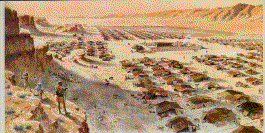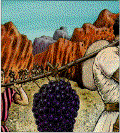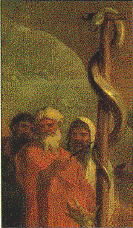The Torah: Numbers: Life as a Pilgrimage
Organization for Worship: Chapters 1-10:10
Moses numbers the tribes: chapters 1–2
One month after setting up the tabernacle, Moses and Aaron conducted a census. The purpose was to number all men over 20 who qualified for military service. God exempted the Levites because of their religious obligations to the community. The camp was arranged around the tabernacle, showing that the worship of God was central to the nation’s existence. In the New Testament era, members would be placed in the body, with Christ as the head (1 Corinthians 12).
When the Israelites moved, the three eastern tribes, headed by Judah, led the way. This same rectangular formation was popular in Egyptian warfare strategy. Ramses II, for example, used it in his Syrian campaign (circa 1279 B.C.). Perhaps God was allowing Moses to make good use of the military training he had received in Egypt.
|
|
| “So the Israelites did everything the Lord commanded Moses; that is the way they encamped under their standards, and that is the way they set out, each with his clan and family” (Numbers 2:34). |
The Levites commissioned: chapter 3
Earlier, God had set apart Israel’s firstborn (Exodus 12). Now, God set apart the Levites as “substitutes for all the firstborn” (Numbers 3:12, New Revised Standard Version). The idea of substitutionary atonement was central to God’s people ever since God substituted a sacrificial ram for Abraham’s son, Isaac (Genesis 22:13). It was reiterated through the Passover lamb in the Israelites’ escape from Egypt (Exodus 12) and repeated in their regular sacrifices (Leviticus 4). It was designed by God to foreshadow the role of his firstborn Son, Jesus Christ (Mark 10:45).
Duties of Levitical families: chapter 4
This Levitical census listed all men between 30 and 50 eligible for service in the tabernacle. The Kohathites, Gershonites and Merarites were appointed to guard and transport the holy things of God through the wilderness.
Laws of purity: chapter 5
Chapter 5 illustrates the need for the newly organized nation to be pure. For example, isolation and observation were required in all suspected cases of leprosy. [See commentary on Leviticus 13–14.]
The principle of restitution in God’s law (verses 5-10; Luke 19:8) was unique among ancient law codes. It demonstrates an important Christian principle: When we have wronged others, we should look for ways to set matters right.
Trials by ordeal were common in the ancient world. Such trials in other cultures utilized magic and sorcery. The test for adultery, however, safeguarded a wife from an unjust accusation by her husband (Numbers 5:11-31). It served to remove suspicion and doubt. Some scholars feel that the judgment of guilt described here caused the loss of capacity to bear children. There is no biblical record of such a test ever being used.
The Nazirite vow: chapter 6
This special vow was a voluntary dedication to God. Usually, the vow was for a limited time, but Samson was set apart as a Nazirite for life. Samuel and John the Baptist may also have been Nazirites.
Requirements for a Nazirite |
|
Freewill offerings: chapter 7
The princes of the tribes brought freewill offerings for the tabernacle and the dedication of the altar. Verses 84-88 give the total offering as 2,400 silver shekels, 120 gold shekels and 252 sacrificial animals.
Giving is an important part of worship, and God loves a cheerful giver (Hebrews 13:15-16; 2 Corinthians 9:6-8). The voice from the mercy seat (Numbers 7:89, NKJV) demonstrated God’s pleasure for Israel’s generosity. This fulfilled God’s promise recorded in Exodus 25:22.
Purification of the Levites: chapter 8
Vital symbolism is presented in this chapter. The dedication of the Levites prefigures our consecration to God for his service (Romans 12:1-2). The Levites belonged to God. They dedicated themselves, not in order to become his, but because they were his. We, too, are God’s own children, dedicating our lives to him because we are his (1 John 3:2-3).
The second Passover: chapter 9:1-14
God instructed Israel to observe the Passover. Those who missed it for legitimate reasons, such as being unclean or away on a journey, were permitted to observe a Passover one month later. A “second chance” is not given for any other festival; this indicates the importance of the Passover for the Israelite community.
God’s guidance: chapter 9:15-23
God led his people with a pillar of cloud by day and a pillar of fire by night. In the wilderness of this world of sin, Christians need the guidance of God’s Holy Spirit by day and by night (Romans 8:9-14).
The silver trumpets: chapter 10:1-10
These trumpets were used for summoning the Israelites and breaking up camp. They announced God’s feast days and new months, and they sounded the alarm in times of war. Long trumpets like these were common in Egypt. Some were discovered in the funeral chamber of Tutankhamen (circa 1333-1323 B.C.).
Israel in the Wilderness Numbers 10:11–21:35
The wilderness march: chapter 10:11-36
As you read this story, bear in mind that, while the march through the wilderness was necessary, the wandering was not. Israel could have traveled from Mt. Sinai to Canaan in about two weeks. But, because of their disobedience, they wandered in the wilderness 40 years.
Complaints about food: chapter 11
Murmuring broke out in the camp: “The people complained” (verse 1). The Israelites had welcomed the delicious manna at first, but now they were tired of the monotonous daily rations. They craved the delicacies of Egypt: fish, cucumbers, melons, leeks, onions and garlic (verse 5).
God answered the people’s demand for meat by showering them with more quail than they could eat. The rebellious attitude that lay behind their discontent was punished with a plague.
Moses’ leadership challenged: chapter 12
Miriam and Aaron began to gossip about Moses. The Hebrew verb form here, watedabber, is feminine singular, implying that Miriam led in this criticism. The pretext used was Moses’ marriage to a foreign woman, but the real cause was envy of Moses’ position and authority. Envy is a damaging emotion (Proverbs 14:30), and Miriam’s action delayed the progress of Israel’s journey for seven days (Numbers 12:15).
Exploring Canaan: chapters 13-14
|
|
| “When they reached the Valley of Eshcol, they cut off a branch bearing a single cluster of grapes. Two of them carried it on a pole between them” (Numbers 13:23). |
Deuteronomy 1:19-25 explains that at this point Moses wanted to go straight on into the Promised Land. In fact, he challenged Israel to take possession of it. But the people suggested that he send scouts ahead to check out the territory. Moses consented to the plan (verses 21-23).
The land was truly all God said it was (Numbers 13:26-27). Joshua and Caleb, two of the scouts, were eager for the Israelites to take possession of the land God had promised them. But the Israelites listened to the 10 faithless scouts with their tales about the great walled cities and the giants of Anak. God’s perspective, as reported by Joshua and Caleb, was forgotten. Within a few miles of their goal, Israel had again given up.
God’s anger was stirred once more, and only Moses’ intervention saved the nation from total destruction (Numbers 14:13-19). But Israel’s punishment for this act of rebellion was severe: “But you — your bodies will fall in this desert. Your children will be shepherds here for forty years…one year for each of the forty days you explored the land” (verses 32-34).
Additional offerings: chapter 15
Although most of the people would eventually die in the wilderness, God would bring the next generation into the Promised Land. They were to make additional offerings once in the land (verses 1-31).
Korah’s rebellion: chapter 16
“Korah’s rebellion” (Jude 11) was a rejection of Moses’ authority as God’s chosen spokesman. Korah unfairly criticized Aaron’s leadership of the priesthood, while Dathan and Abiram blamed Moses for failing to bring Israel into the Promised Land. Their real rebellion, though, was against God (Numbers 16:11).
God demonstrated that Moses and Aaron were his servants, and punished the rebels: “And the earth opened its mouth and swallowed them, with their households and all Korah’s men and all their possessions. They went down alive into the grave, with everything they owned; the earth closed over them, and they perished and were gone from the community” (verses 32-33).
Aaron’s staff: chapter 17
Korah had publicly ridiculed the priesthood. With the miracle of Aaron’s budding staff (verse 8), God once again confirmed through whom he was working. The staff was placed as a memorial inside the ark of the covenant (Hebrews 9:4).
The Levitical priesthood: chapter 18
The Levites and priests were not allowed to inherit rural land. This was to prevent the growth of a wealthy priestly class such as those in Egypt and other nations around Israel. God was the inheritance of the Levites and priests. He gave the Levites the tithes of the nation and they, in turn, gave one tenth to the priests (verses 24-28).
The red heifer: chapter 19
The detailed cleansing process described here should remind us of the need to lead a spiritually clean life. If one is to be a “vessel for honor,” one must be purged from sin (2 Timothy 2:21, NKJV).
Death of Aaron and Miriam: chapter 20
Death dominates this chapter. It opens with the death of Miriam and closes with the death of her brother Aaron. Miriam, Aaron and Moses all died in the same year (verses 25-26; 33:38; Deuteronomy 34:5-8).
Thirty-eight years had passed since Numbers 13:1. These long years of wandering were filled with failure and death (Amos 5:25-26; Acts 7:42-43; 1 Corinthians 10:1-10). Yet God remained loyal to this sinful nation: “The Lord your God has blessed you in all the work of your hands. He has watched over your journey through this vast desert. These forty years the Lord your God has been with you, and you have not lacked anything” (Deuteronomy 2:7).
Moses’ sin (Numbers 20:2-13) shows how one of God’s greatest servants, even after a long life of obedience to God, stumbled. He disobeyed God. He should have spoken to the rock, not struck it. Though God called Moses the most humble man on earth (Numbers 12:3), in this instance Moses was guilty of self-exaltation, claiming credit and assuming authority that was not his. As a result of this sin of broken faith, God decreed that Moses would not enter the Promised Land (Deuteronomy 32:51-52).
The bronze snake: chapter 21
God gave the Israelites a great victory over the Canaanite king of Arad (verses 1-3). But the celebration was short-lived and the people continued to complain. God punished this rebellion with a plague of poisonous snakes (1 Corinthians 10:9).
|
|
| “The Lord said to Moses, ‘Make a snake and put it up on a pole; anyone who is bitten can look at it and live’” (Numbers 21:8). |

At God’s command, Moses constructed a bronze snake and hung it on a pole. Those bitten by poisonous snakes were told to look at the bronze snake in order to be healed. The bronze snake prefigured our Lord and Savior Jesus Christ, who was lifted up for us on the cross (John 3:14-15).
Satan had appeared as a serpent when he deceived Adam and Eve. Subsequently, the serpent became an illustration in nature of the effects of sin. The bronze snake on the pole foreshadowed sin judged on the cross of Christ. The Israelites, looking to the bronze snake for healing of their snake bites (Numbers 21:8-9), typified the Christian faith in the crucifixion of Christ for spiritual healing of the venom of sin (Romans 4:24-25). The bronze snake later became an object of idolatry in Israel until King Hezekiah destroyed it around 700 B.C. (2 Kings 18:4).
Israel and Moab: Numbers 22–36
Balak and Balaam: chapters 22-24
With Israel camped on his border, Balak, king of Moab, asked Balaam, prophet and diviner, for help. Balak wanted Balaam to come and curse Israel. At that time, it was a routine business arrangement for a king to hire a prophet to try to influence events by pronouncing blessings and curses.
Balaam responded to Balak’s offer of a reward. However, God turned the tables on Balak and used Balaam initially to bless Israel. Balaam was a mercenary prophet who exploited others. The Bible calls such unscrupulous greed “the way of Balaam” (2 Peter 2:15) and “Balaam’s error” (Jude 11).
The doctrine of Balaam: chapter 25
It was on Balaam’s advice that the Moabite women seduced the men of Israel at Peor. Balaam supposed that a righteous God would curse the people for sinning. Eventually, God took Balaam’s life for this sedition (verses 1-18; 31:8, 16; Joshua 13:22).
The local deity at Peor, “Baal” (meaning “master”), became a proper name for the great fertility god of the Canaanites. The events described in this chapter illustrate the intoxicating, but ultimately deadly, blend of sexual and religious practices that characterized the Canaanite forms of worship. When the Israelites entered Canaan, they succumbed to these ungodly rituals and broke their covenant with God.
The second census: chapter 26
As Israel was about to enter the Promised Land, God took another census. This new revision of the military lists provided figures for a more equitable division of the land by the drawing of lots.
Women’s inheritance: chapter 27:1-11
In other ancient Near Eastern countries, women could not normally inherit property and land. But in Israel God permitted brotherless daughters to do so if they married within their own tribe (Numbers 36:8).
Joshua anointed: chapter 27:12-23
Moses showed humility and selflessness in thinking of the interests of God’s people (verses 15-17), even though details about his own death and the reason for it had been explained by God (verses 12-14).
God then invested authority in Joshua to lead the Israelites into the Promised Land (verses 18-20). Joshua had been Moses’ chief assistant for many years (Exodus 17:9; 24:13; 33:11; Numbers 11:28; 14:6-9). Moses transferred the mantle of leadership to his faithful attendant and friend (Deuteronomy 34:9).
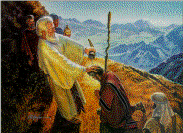
“The Lord said to Moses, ‘Take Joshua son of Nun, a man in whom is the spirit, and lay your hand on him. Have him stand before Eleazar the priest and the entire assembly and commission him in their presence. Give him some of your authority so the whole Israelite community will obey him’ ” (Numbers 27:18-20). Click on image for larger view. |
Vows and public worship: chapters 28-30
Chapters 28 and 29 discuss how Israel was to worship God after they had entered the Promised Land. In chapter 29, prominence is given to the Feast of Tabernacles and its offerings. (There are 23 verses here about Tabernacles, but only 11 verses are devoted to this Feast in Leviticus 23:33-43.)
Chapter 30 explains that men in Israel were bound by vows of any kind (verses 1-2). The terms under which vows made by women were binding are given in verses 3-15. [Compare this chapter with Leviticus 27.]
Vengeance on Midian: chapter 31
The Midianites were responsible for enticing Israel into Baal worship (Numbers 25:1-3). God’s vengeance on Midian, “reiterates that it is important for God’s people to know how to deal with sin. The seducing Midianites…show sin’s vicious and virulent nature. God deals with sin ruthlessly and calls His people to deal with it similarly in their own personal lives” (The Spirit-Filled Life Bible, NKJV, p. 251).
The Transjordan tribes: chapter 32
Reuben, Gad and the half-tribe of Manasseh requested that their inheritance be east of the Jordan River (verses 1-5), just outside the eastern boundary of Canaan (Numbers 34:12). It is possible that by asking for territory outside of Canaan, these tribes showed a lack of faith and a desire to avoid responsibility in the upcoming war effort.
Moses’ rebuke reminded the tribes of the terrible consequences of similar unbelief that had been shown at Kadesh, when the scouts were sent out. He eventually accepted their compromise: They would fight alongside their brothers in Canaan before settling down (Numbers 32:16-24).
Travelogue of Israel: chapter 33
This retrospective chapter summarizes Israel’s journey from Egypt to Canaan. God then gave directions to exterminate the Canaanites. Idolatry was to be rooted out. God warned, “If you do not drive out the inhabitants of the land, those you allow to remain will become barbs in your eyes and thorns in your sides” (verse 55). As you can read in the books of Joshua and Judges, this is exactly what happened. The Israelites did not drive out the Canaanites, and soon they began to pick up their pagan religious beliefs and practices.
Israel’s failure has important implications for Christians today.
Just as the Israelites were hesitant to clear out all the wicked people, we are sometimes hesitant to clear out all the sin in our lives…. But Hebrews 12:1, 2 tells us to throw off “the sin that so easily entangles” us. We all have “idols” we don’t want to let go of (a bad habit, an unhealthy relationship, a certain life-style). If we allow these idols to dominate us, they will cause serious problems later. (Life Application Bible, NIV, commentary on Numbers 33:55)
Tribal boundaries: chapter 34
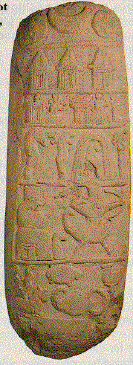
The Kudurru Stone: Kudurru is an early Mesopotamian term that refers to an oval, or pillar-shaped, boundary marker, set up to show that certain property was a royal grant. Each stone was usually engraved with three items: the images of deities to protect the property, curses against those who would remove the stone and blessings on those who honored it. |
The tribal boundaries of the Promised Land were determined by sacred lot. No tribe had absolute claim to its own land. Every inheritance was a gift from God.
Levitical cities and cities of refuge: chapter 35
Forty-eight Levitical cities are listed (verses 1-8). These were set apart because the Levites were not entitled to the usual tribal inheritance (Leviticus 25:32-34; Joshua 21; 1 Chronicles 6:54-81).
The six cities of refuge, or asylum, are also described (Numbers 35:6-34; Deuteronomy 4:41-43; 19:1-13). If a person was accidentally responsible for another’s death, a relative of the victim (“avenger of blood”) could hunt down and execute the murderer (“the law of blood revenge”). (There was no police force.) The cities of refuge put a control on this practice by protecting the alleged murderer from the avenger of blood. By creating these cities of refuge, God was making allowance for involuntary manslaughter (Numbers 35:22-28). The city assembly judged whether the killing was accidental (manslaughter) or intentional (murder).
Laws protecting female inheritance: chapter 36
We return again to the question of inheritance. The tribe of Manasseh requested that a tribal inheritance, involving five women, be kept within their tribe. Moses approved this request.
Resolving the question of inheritance is a fitting way to end the book of Numbers. One generation of Israelites had marred its inheritance. But God justified their children, even without their knowledge. He was determined to fulfill his plan by establishing the next generation of the children of Israel in the land he had promised their father Abraham (Genesis 15:18-21).


